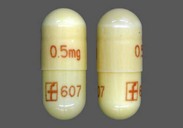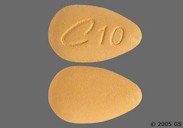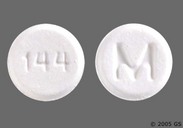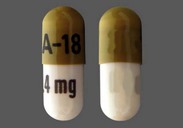T
Drug Class:
Cholinesterase Inhibitor
Precautions And Contraindications
Known hypersensitivity to tacrine, patients previously treated with tacrine who developed jaundice
Serious Reactions
! Overdose can cause cholinergic crisis, marked by increased salivation, lacrimation, bradycardia, respiratory depression, hypotension, and increased muscle weakness. Treatment usually consists of supportive measures and an anticholinergic, such as atropine.
Dental Considerations
General:
• Patients on chronic drug therapy may rarely have symptoms of blood dyscrasias, which can include infection, bleeding, and poor healing.
• Monitor vital signs at every appointment because of cardiovascular and respiratory side effects.
• After supine positioning, have patient sit upright for at least 2 min before standing to avoid orthostatic hypotension.
• Assess salivary flow as a factor in caries, periodontal disease, and candidiasis.
• Take precautions if dental surgery is anticipated and anesthesia is required.
• Consider semisupine chair position for patient comfort because of GI effects of drug.
• Place on frequent recall because early attention to dental health is important for Alzheimer’s patients.
Drug Class:
Indications And Dosages
Serious Reactions
! Nephrotoxicity (characterized by increased serum creatinine level and decreased urine output), neurotoxicity (including tremor, headache, and mental status changes), and pleural effusion are common adverse reactions. Thrombocytopenia, leukocytosis, anemia, atelectasis, sepsis, and infection occur occasionally.
Dental Considerations
FK506
General:
• Patients on immunosuppressant therapy have increased susceptibility to infection.
• Patients on chronic drug therapy may rarely have symptoms of blood dyscrasias, which can include infection, bleeding, and poor healing.
• Monitor vital signs at every appointment because of cardiovascular side effects.
• Prophylactic antibiotics may be indicated to prevent infection if surgery or deep scaling is planned.
• Examine for evidence of oral candidiasis. Topically acting antifungals may be preferred.
Consultations:
• Medical consultation may be required to assess disease control.
• In a patient with symptoms of blood dyscrasias, request a medical consultation for blood studies and postpone dental treatment until normal values are reestablished.
• Consult with patient’s physician for recommendations on possible antibiotic prophylaxis before dental treatment or when considering use of systemic antifungals.
Teach Patient/Family to:
tadalafil
Do not confuse with tadalafil with sildenafil or vardenafil, or Adcirca with Advair or Advicor.
Indications and Dosages
Precautions and Contraindications
Hypersensitivity to tadalafil or any component of the formulation. Concurrent use of nitrates in any form. May cause auditory and visual disturbances, including hearing and vision loss. Not recommended for use in patients with severe cardiovascular disease (hypotension, uncontrolled hypertension, angina, arrhythmias, stroke) and bleeding disorders.
Drug Interactions of Concern to Dentistry
• CYP3A4 inhibitors (e.g., macrolide antibiotics, azole antifungals, midazolam, triazolam): increased hypotension.
• Opioids, alcohol: hypotension.
• Nitrates (e.g., nitroglycerin) can potentiate hypotension associated with tadalafil, with potential loss of consciousness and cardiovascular depression.
tafluprost
Drug Class:
Antineoplastic, antiestrogen hormone
Serious Reactions
! Retinopathy, corneal opacity, and decreased visual acuity have been noted in patients receiving extremely high dosages (240–320 mg/day) for longer than 17 mo.
! There has been an increased number of incidences of endometrial changes, thromboembolic events, and uterine malignancies while using tamoxifen.
Drug Class:
Mechanism Of Action
An α1 antagonist that targets receptors around bladder neck and prostate capsule.
Serious Reactions
! First-dose syncope (hypotension with sudden loss of consciousness) may occur within 30–90 min after administration of initial dose and may be preceded by tachycardia (pulse rate of 120–160 beats/min).
Dental Considerations
General:
• Monitor vital signs at every appointment because of cardiovascular and respiratory side effects.
• Consider semisupine chair position for patient comfort when GI side effects occur.
• After supine positioning, have patient sit upright for at least 2 min before standing to avoid orthostatic hypotension.
Drug Class:
Mechanism Of Action
Centrally-acting analgesic, mu opioid receptor agonist and inhibitor of norepinephrine reuptake.
Precautions And Contraindications
Hypersensitivity to tapentadol hydrochloride or its ingredients, children under the age of 18
Serious Reactions
! CNS depression with or without respiratory depression
! Serotonin syndrome (agitation, coma, autonomic instability including tachycardia, neuromuscular abnormalities, diarrhea, nausea, vomiting)
! Drug abuse, withdrawal syndrome with abrupt discontinuation of prolonged use
Stay updated, free dental videos. Join our Telegram channel

VIDEdental - Online dental courses


 Alzheimer’s Disease
Alzheimer’s Disease Dosage in Hepatic Impairment
Dosage in Hepatic Impairment
 Prevention of Liver Transplant Rejection
Prevention of Liver Transplant Rejection Prevention of Kidney Transplant Rejection
Prevention of Kidney Transplant Rejection Atopic Dermatitis
Atopic Dermatitis Pulmonary Arterial Hypertension
Pulmonary Arterial Hypertension
 Renal Impairment
Renal Impairment Hepatic Impairment
Hepatic Impairment Treatment of Glaucoma
Treatment of Glaucoma
 Adjunctive Treatment of Breast Cancer
Adjunctive Treatment of Breast Cancer Prevention of Breast Cancer in High-Risk Women
Prevention of Breast Cancer in High-Risk Women
 BPH
BPH Analgesia
Analgesia Irritable Bowel Syndrome
Irritable Bowel Syndrome Chronic Constipation
Chronic Constipation